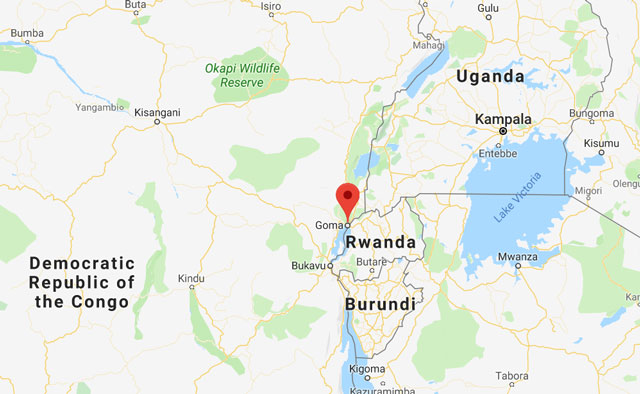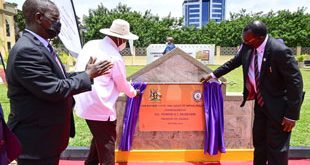Kigali, Rwanda | THE INDEPENDENT & AFP | Rwanda’s border with the Democratic Republic of Congo is not closed, the country’s ministry of health has clarified in a statement.
The statement comes hours after DRC President Felix Tshisekedi’s office condemned what it said was the closure of the border, that affected citizens from both countries who had to cross the border as part of their daily life.
Rwanda denied it had closed the border, saying they were simply stepping up their Ebola surveillance systems following the death of a third person in nearby Goma in DRC.
“The Ministry of Health confirms that Rwanda’s border with the Democratic Republic of Congo is open, following traffic slow-down this morning as measures were put in place to reinforce screening procedures and public safety at entry points,” their statement said.
Rwanda is Ebola free, and screening for symptoms at points of entry has been ongoing since the beginning of the outbreak in the DRC, and has been reinforced since the confirmation of cases in Goma.
DRC complains
An AFP reporter at the Goma-Gisenyi crossing found the frontier closed earlier on Thursday.
“On the basis of a unilateral decision by the Rwandan authorities, Rwandan citizens cannot go to Goma and Congolese cannot leave Gisenyi but are prevented from going home,” the DRC statement had said.
Goma, a city of two million people and a major transport hub, shares the border with the Rwandan city of Gisenyi, which has a population of more than 85,000.
Cross-frontier links are intense. Many people have jobs on the other side of the border while others have homes or put their children in schools in the neighbouring city.
“On the basis of a unilateral decision by the Rwandan authorities, Rwandan citizens cannot go to Goma and Congolese cannot leave Gisenyi but are prevented from going home,” the statement said.
“This decision harms a number of Congolese and expatriates who live in Gisenyi but work in Goma.”
It added: “The Congolese authorities regret this kind of decision, which goes against the recommendation of the World Health Organization.”
Rwanda ready to fight Ebola
While refuting DRC’s claim, Rwanda stated that they have a detailed National Preparedness Plan in place and has trained health workers in early detection and response, educated communities about Ebola, vaccinated health workers in high-risk areas, equipped health facilities, and continues to conduct simulation exercises to maintain a high level of readiness.
To date, Rwanda has trained over 23,957 people including Doctors, Nurses, hospital staff, Community Health Workers, religious leaders, Red Cross Volunteers and security organs.
An Ebola Treatment Centre was put in place and 23 isolation units are being prepared in hospitals in 15 priority districts. Ebola response simulation exercises are on a regular basis within the community, borders, airport and treatment Centre to test Rwanda’s preparedness in response to a case, which includes emergency Operations Centre activation, active surveillance, case management and laboratory testing. About 3000 health workers in high-risk areas have been vaccinated as a preventative measure, including more than 1100 in Rubavu district.
Laborious fight –
Ebola is named after a river in northern DRC, then named Zaire, where the virus was first identified in 1976 by a Belgian-led scientific team.
Its virus causes fever, vomiting and severe diarrhoea, often followed by kidney and liver failure, internal and external bleeding.
The disease is spread by contact with infected body fluids and is fought with time-honoured but laborious techniques of tracing contacts and quarantining them.
Nurses and doctors have to dress in full-protection biohazard suits and respect intensive disinfection measures.
There is no medical cure for Ebola, although an unlicensed but tested vaccine has been widely deployed to help protect frontline workers.
The latest epidemic is the second deadliest on record after more than 11,000 people were killed in Guinea, Sierra Leone and Liberia between 2014-2016.
 The Independent Uganda: You get the Truth we Pay the Price
The Independent Uganda: You get the Truth we Pay the Price


